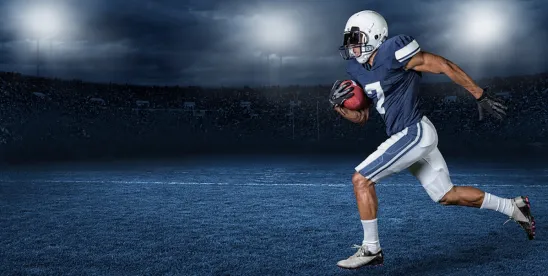Rolanda Brandon—the mother of sixteen-year-old star quarterback Faizon Brandon, the Greensboro, North Carolina, Grimsley High School football player who has committed to play for the University of Tennessee Volunteers in 2026—recently filed a lawsuit on behalf of her son in Wake County Superior Court, challenging the North Carolina State Board of Education’s and North Carolina Department of Public Instruction’s name, image, and likeness (NIL) prohibitions that ban current public high school athletes from earning NIL money during high school.
Quick Hits
- The mother of a top-rated high school football prospect has sued the North Carolina State Board of Education and North Carolina Department of Public Instruction on his behalf over the state’s name, image, and likeness (NIL) prohibitions for high school athletes.
- The lawsuit’s outcome will affect public school athletes’ ability to monetize their NIL value until July 2025 when the North Carolina State Board of Education revisits this prohibition at its annual meeting.
- Former collegiate athletes have begun to file similar NIL suits.
What is the significance of the lawsuit? Long term: The lawsuit’s outcome will affect North Carolina public school athletes’ ability to monetize their NIL value for years to come. Short term: Current public school athletes like Faizon Brandon are potentially losing out on thousands of dollars every day.
The Lawsuit
On August 23, 2024, Rolanda Brandon, as parent and guardian of her son, Faizon Brandon, filed a complaint alleging that the state board of education had exceeded its authority by preventing her son and other North Carolina public school athletes from generating income based on their NIL rights.
Notably, more than three years ago, on July 1, 2021, the National Collegiate Athletic Association (NCAA) adopted groundbreaking policies permitting athletes at its member schools to utilize their NIL rights for commercial purposes, following in the footsteps of several state laws. NIL activities include signing autographs, making public appearances, taking photographs, and selling or endorsing merchandise, among other things. Overall, NIL policies give athletes the right to publicize themselves and gain monetary benefit from the publicity. Naturally, NIL activities then began to emerge at the high school level.
In North Carolina, the public schools and private schools took diverging positions on NIL policies. The North Carolina High School Athletic Association (NCHSAA), which governs public schools, prohibited NIL activities for its members, but the North Carolina Independent Schools Athletic Association (NCISAA), which governs private schools, permitted their members to earn compensation with NIL deals. Simply put, since 2021, North Carolina private school athletes have been allowed to earn money with NIL deals while their public school counterparts have not.
The NCHSAA soon reversed course. In May 2023, the NCHSAA changed its rules to address this issue and allowed public school athletes to earn compensation with NIL deals. However, on October 3, 2023, the North Carolina General Assembly’s Senate Bill 452, authorizing the state board of education to regulate public high school athletes’ use of their NIL for commercial purposes, became law.
On April 30, 2024, Brandon received the NIL offer that is at the center of the lawsuit. According to the complaint, “a prominent national trading card company” offered Brandon a deal to sign memorabilia before he graduated from high school—an agreement that would provide Brandon and his family with “financial security for years to come.” The deal would allow Brandon to monetize his NIL until his projected high school graduation date in December 2025.
The state board of education approved a temporary rule on June 6, 2024, preventing North Carolina public school athletes from earning compensation under NIL deals, effective July 1, 2024.
The complaint alleges that Brandon attempted to resolve this dispute with the state board of education approximately a week before the rule became effective, but he did not receive a response until July 3, 2024—two days after the ban became effective.
The complaint further alleges that the trading card company has already hinted at rescinding the deal if an agreement cannot be reached. As the state board of education’s rule stands right now, Brandon may not sign the offered NIL deal, if he wants to maintain eligibility, and he could lose the deal—causing him to miss out on substantial earnings.
On the same day that she filed the complaint, Rolanda Brandon, on behalf of her son, filed a motion for preliminary injunction set to be heard on September 30, 2024, in Raleigh, North Carolina, in conjunction with the underlying lawsuit.
A motion for preliminary injunction requests that the court prevent a party from taking action while a case is pending. Brandon’s motion seeks to prohibit the state board of education from enforcing its July 1, 2024, NIL ban until the resolution of the lawsuit. To prevail, Rolanda Brandon must show (1) a likelihood of success on the merits of the claim, and (2) her son will suffer irreparable harm unless the injunction is issued.
NIL in North Carolina: Public Schools vs. Private Schools
North Carolina is one of only twelve states that do not permit public high school athletes to benefit from NIL deals before the collegiate level. As noted above, this restriction does not apply to private schools. Athletes enrolled in private schools competing in the NCISAA are permitted to make commercial use of their NIL rights. For example, David Sanders, the No. 4 overall prospect for 2025, who plays for Charlotte’s Providence Day School (and who also committed to the University of Tennessee), has a website devoted to selling merchandise with his image.
The outcome of Brandon v. North Carolina State Board of Education holds potential consequences for North Carolina high school athletics. Why would any star athlete in the state of North Carolina choose to play in public school, uncompensated, when opportunity exists up the road to receive a scholarship or paid tuition, play for a local private school, and earn NIL income? Or this: Star athletes born and raised in North Carolina could choose to move to one of the thirty-eight states permitting NIL deals for high school athletes. Losing homegrown talent would likely have significant consequences for the Tar Heel State’s members of top-tier collegiate athletic associations.
In addition, North Carolina has a long history of producing homegrown elite athletes who often choose to attend college in their home state. The state’s NIL restrictions could significantly affect North Carolina public school sports teams, ticket sales, collegiate recruiting, collateral income generated by local sports, and the long-standing tradition of North Carolina public high schools developing elite athletes. It is a tradition most North Carolinians are proud of, and do not want to lose.
Former Collegiate Athletes Also File NIL Suits
NIL disputes are not just affecting high school athletes. Former collegiate athletes have begun to file similar suits.
On September 23, 2024, Super Bowl champion Reggie Bush filed suit alleging he was entitled to payment for use of his NIL and athletic ability while he played collegiate football. The basis of the suit is not unique to Bush. Ten former players of North Carolina State University’s 1983 NCAA National Championship Men’s Basketball team, known as the “Cardiac Pack,” filed a similar suit against the NCAA in June 2024. The Cardiac Pack plaintiffs are seeking compensation for the unpaid use of their NIL by the NCAA. That lawsuit also claims that the NCAA continues to benefit monetarily from the use of old archived footage for marketing purposes of the 1983 National Championship team.
The cases of Brandon v. North Carolina State Board of Education and Cardiac Pack v. NCAA have something in common: Both current and former athletes want to be compensated for the use of their NIL rights by schools, conferences, and athletic associations that have received significant monetary benefits. These cases are certainly ones to monitor as they proceed through litigation in Wake County Superior Court.
The cases also highlight the plight of current and former athletes and how NIL rules have revolutionized their ability to seek compensation for their athletic ability and the use of their NIL rights. These cases also highlight the overlap of sports and socioeconomic status, an intersectionality analysis to be explored in a subsequent article.




 />i
/>i

